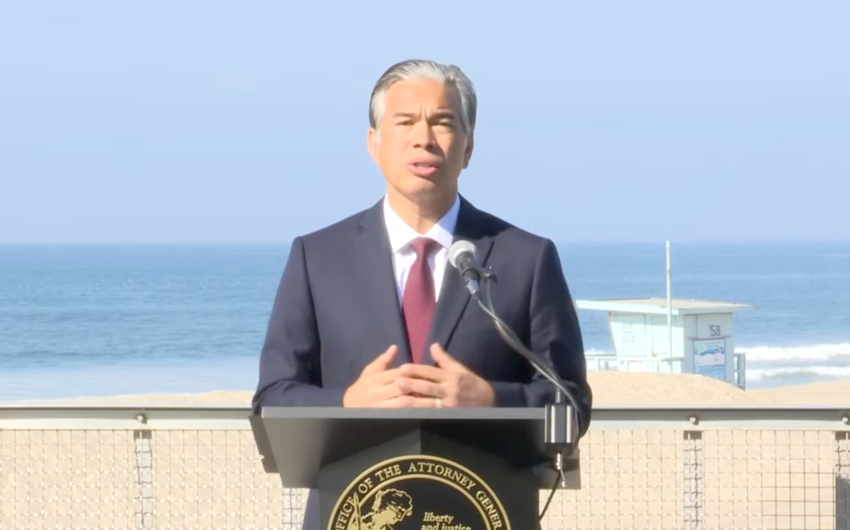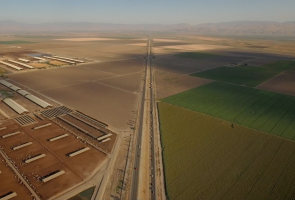Toxic “forever chemicals,” known as PFAS, are currently a focus of the world’s acronym-loving attention. Although they have been around for decades, these stubborn chemicals have achieved a new level of celebrity — and they are quickly being canceled.
Many Santa Barbara residents are likely wondering: Should we be worried? And the short answer is: yes and no.
Known as “forever chemicals” because they are difficult to break down, PFAS (of which there are thousands) are linked to serious health problems including cancer, liver damage, thyroid disease, decreased vaccine response, and developmental and reproductive complications.
They are so dangerous, in fact, that the United Nations recently declared PFAS pollution in North Carolina — which has the third highest water contamination of PFAS of any state — as a human rights violation. Manufacturers DuPont and Chemours — who knew and hid the risks of PFAS from the public — polluted the state’s drinking water with PFAS, “disregarding the rights and well-being of residents” for decades, according to the UN statement. Those companies are now paying out billions of dollars in settlements for the damage done.
But that barely scratches the surface. These chemicals are in everything, including clothes, makeup, ski wax, and microwave popcorn. They are contaminating landfills, soil, air, water, and the blood of both humans and wildlife, even reaching remote colonies of non-migratory seabirds in Norway. It is so widespread that it is believed that nearly every human being on Earth has some level of PFAS in their blood.
According to the Environmental Working Group, “at some landfills, PFAS are detected at levels in the tens of thousands of parts per trillion.”
For comparison, this month, the Environmental Protection Agency finalized a four parts per trillion limit on six of the most notorious PFAS in drinking water. It is an extremely small number, but they are toxic even in low quantities, especially if they are allowed to build up through consistent exposure, explained Santa Barbara Water Quality Superintendent Gaylen Fair. However, Fair described the City of Santa Barbara as “one of the lucky few.”
In Santa Barbara, PFAS may be a household name but not a household concern, at least when it comes to what’s coming out of the tap. For the city, these chemicals exist in such low concentrations — if at all — in the water supply that the tests just spit out “non-detect” or “less than limit” when measuring for it.
“I feel very fortunate that we’re not in the center of this mess,” said Water Resources Manager Joshua Haggmark. “But a lot of communities are going to be devastated by this and have to go and spend extensive amounts of money to try and clean this stuff up.”

The reason Santa Barbara has evaded the sticky situation is because the city gets its water from sources such as the Santa Ynez River that are distanced and protected from industrial pollution and other sources of this kind of contamination.
However, as said by Haggmark, “we’re going to get dragged into this at some point on the wastewater side because people are using these chemicals in their homes, whether knowingly or not. And they’re washing into the wastewater stream, so we now need to make sure that we can somehow take it out.”
He lamented the extensive use of these chemicals and, again, their presence in “literally everything,” including carpet and household cleaners. When testing for PFAS, their analyst cannot shower for a day, and cannot wear makeup or deodorant, to avoid contaminating the samples.
“It makes me just want to scream,” Haggmark said during our virtual meeting. “We’re making these products that clearly don’t belong anywhere in our communities. And I don’t know whose brainchild idea it was to create something that doesn’t break down and use it in everything. It’s just really maddening that we’re left to clean up the mess.”
Still, Santa Barbara’s drinking water is PFAS-free, and other water districts in Santa Barbara County are similarly safe from PFAS pollution. One South County incident did occur in 2019, when PFOA was detected in one groundwater well at the Santa Barbara Airport, as reported by the Goleta Water District’s (GWD) in 2020. However, the Airport Well has been removed from service, and with the county’s improved water supply outlook, Goleta is currently relying on surface water supplies rather than groundwater wells.
“Treatment is available to filter for PFAS, but it is expensive, and an estimated $15 million in treatment upgrades would be required to return Airport Well to service,” said David Matson of the GWD. “This particular well is located near the City of Santa Barbara’s Airport property, which has since been under remedial investigation by the State Water Resource Control Board for PFAS contamination of soil and groundwater associated with past use of firefighting foam.”
This year, the Goleta district “proactively collected samples for PFAS analysis from all of its water sources,” and PFAS has not been detected, Matson assured.
While individual water districts and utilities will now be held to more stringent standards, federal and state agencies have been taking other steps to address the mess — including the EPA investing half a billion dollars for California drinking water and clean water infrastructure upgrades, growing funding for PFAS research, designating two of the most notorious and well-studied PFAS as hazardous substances under a federal cleanup law, and new state laws banning PFAS in products like cookware and packaging or at least requiring the disclosure of PFAS in such products.
“It’s kind of funny that water gets all this attention, which is very important,” Haggmark said. “But our community is actually interfacing with PFAS every day in so many products, and people should be warned about that.”
Premier Events
Sun, Jan 25
11:00 AM
Santa Barbara
CANCELED – 18th Annual Santa Barbara Community Seed Swap – CANCELED
Sat, Jan 24
7:30 PM
Santa Barbara
Billy F Gibbons and the BFG Band
Sat, Jan 24
7:30 PM
Santa Barbara
Sweet Home Santa Barbara-The Doublewide Kings
Sun, Jan 25
11:00 AM
Santa Barbara
CANCELED – 18th Annual Santa Barbara Community Seed Swap – CANCELED
Mon, Jan 26
6:30 PM
Santa Barbara
Lucinda Lane Returns to SOhO
Tue, Jan 27
7:00 PM
Santa Barbara
CWC Docs: Pistachio Wars
Wed, Jan 28
5:30 PM
Santa Barbara
The Astonishing Tale of Ludmilla and Thad Welch
Fri, Jan 30
6:00 PM
Santa Barbara
Friday Night Supper Club at Tyler x Lieu Dit
Fri, Jan 30
7:00 PM
Santa Barbara
Folk Orchestra of Santa Barbara Medieval Concert – El Presidio Chapel
Sat, Jan 31
7:00 PM
Santa Barbara
Folk Orchestra of Santa Barbara Medieval Concert – Trinity Episcopal Church
Sun, Feb 01
4:00 PM
Los Olivos
Folk Orchestra of Santa Barbara Medieval Concert – St Marks-In-The-Valley
Sun, Jan 25 11:00 AM
Santa Barbara
CANCELED – 18th Annual Santa Barbara Community Seed Swap – CANCELED
Sat, Jan 24 7:30 PM
Santa Barbara
Billy F Gibbons and the BFG Band
Sat, Jan 24 7:30 PM
Santa Barbara
Sweet Home Santa Barbara-The Doublewide Kings
Sun, Jan 25 11:00 AM
Santa Barbara
CANCELED – 18th Annual Santa Barbara Community Seed Swap – CANCELED
Mon, Jan 26 6:30 PM
Santa Barbara
Lucinda Lane Returns to SOhO
Tue, Jan 27 7:00 PM
Santa Barbara
CWC Docs: Pistachio Wars
Wed, Jan 28 5:30 PM
Santa Barbara
The Astonishing Tale of Ludmilla and Thad Welch
Fri, Jan 30 6:00 PM
Santa Barbara
Friday Night Supper Club at Tyler x Lieu Dit
Fri, Jan 30 7:00 PM
Santa Barbara
Folk Orchestra of Santa Barbara Medieval Concert – El Presidio Chapel
Sat, Jan 31 7:00 PM
Santa Barbara
Folk Orchestra of Santa Barbara Medieval Concert – Trinity Episcopal Church
Sun, Feb 01 4:00 PM
Los Olivos























You must be logged in to post a comment.